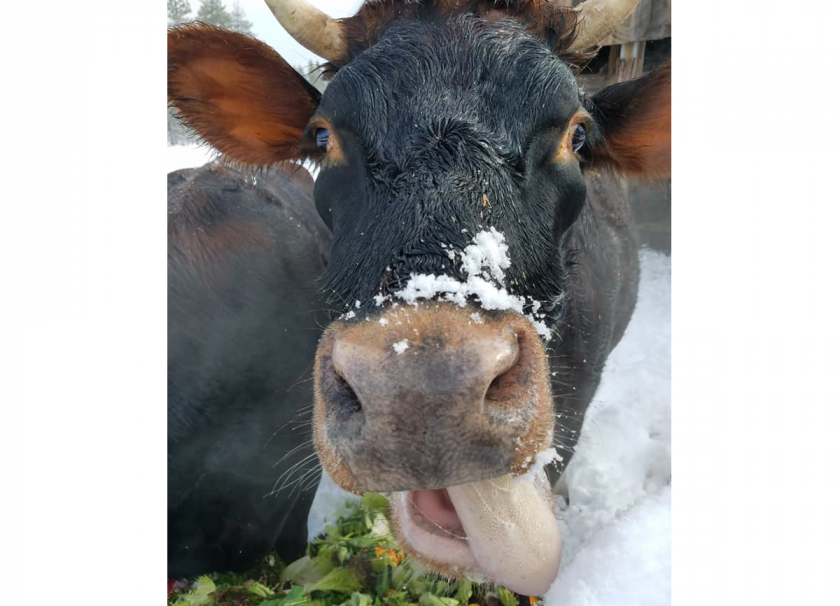
Food waste at the Co-op
By Rianna Koppel, Sustainability Coordinator
How many times in the past month have you reached back in the fridge to snack on some fresh strawberries only to discover… mold?! In the United States, 40% of food is wasted every year. Luckily, how we address food waste can have a major impact. According to Paul Hawkin’s Drawdown, reducing food waste is #3 on the list of best ways to reduce carbon dioxide emissions. At the Co-op, we use the EPA’s Food Recovery Hierarchy as a guide to bettering our own practices.
Source Reduction and Reuse
Ever wonder what happens to a carton of eggs with a cracked bunch? At the Co-op, we reuse these eggs for your breakfast. Deli staff will sort and reuse peaches, strawberries, bananas, and more for bakery goods, smoothies, and cold bar desserts. Imperfect produce can be used for vegetable stock, hot bar meals, or the salad bar. Every day at 8 pm, the Deli hot bar price is reduced to $8.95 per lb to reduce waste.
Feed Hungry People
After resourcing useable food, staff glean the rest. There are several places behind the scenes for employees to discover their dinner. On a regular day, a Co-op employee could glean a few slightly bruised apples, a damaged can of garbanzo beans, a leaky carton of goat milk, and a piece of cornbread from the night before.
Additionally, at the end of every day except Christmas, the Co-op is visited by a special guest: the Ashland Food Angels. The Angels deliver food to the Ashland Emergency Food Bank, which provides emergency food supplies, without charge, to individuals and families in the Ashland/Talent area who would otherwise go hungry.
In total, throughout every year at the Co-op, about 22,000 lbs of healthy, edible food are diverted from the landfill and given to those in need.
Feed Animals
There is one more special guest that visits the Co-op every day - Crack o' Dawn Farm. They pick up several large barrels of food scraps to deliver as fodder for the animals. The scraps are given to goats, cows, and pigs. Deli and Produce staff collect these food scraps for the farm, making sure there are no rubber bands, paper wrapping, or metal twist ties that could injure the animals.
Composting
There are two things that goats and pigs can’t eat: coffee grounds and eggshells. These are the two main components for our compost stream. A local farmer picks up these barrels weekly to add to his compost pile.
Landfill
The last stop on our journey is the landfill. Right now, the Co-op diverts over 80% of our waste, which is a strong step towards our goal of being zero-waste.
Through our practices and commitment to zero waste, we can make an impact in our community. Every time you choose to eat at the Co-op, you are choosing to support local farmers, our staff, and families in need of fresh, healthy food in Ashland and Talent. Instead of food wasters, we can count ourselves as abundant food innovators.
More Co-op News
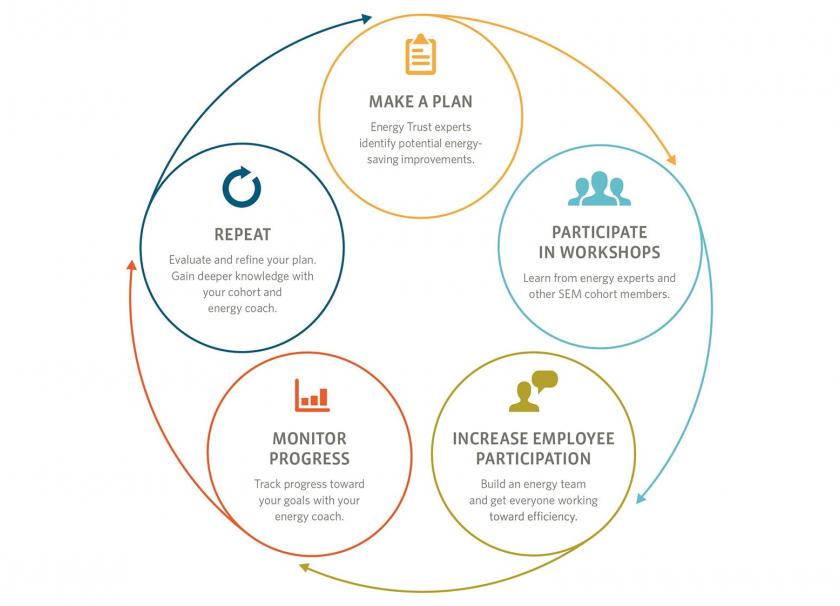
An update on Strategic Energy Management at the Co-op
By Nina Friedman, Strategic Energy Management intern
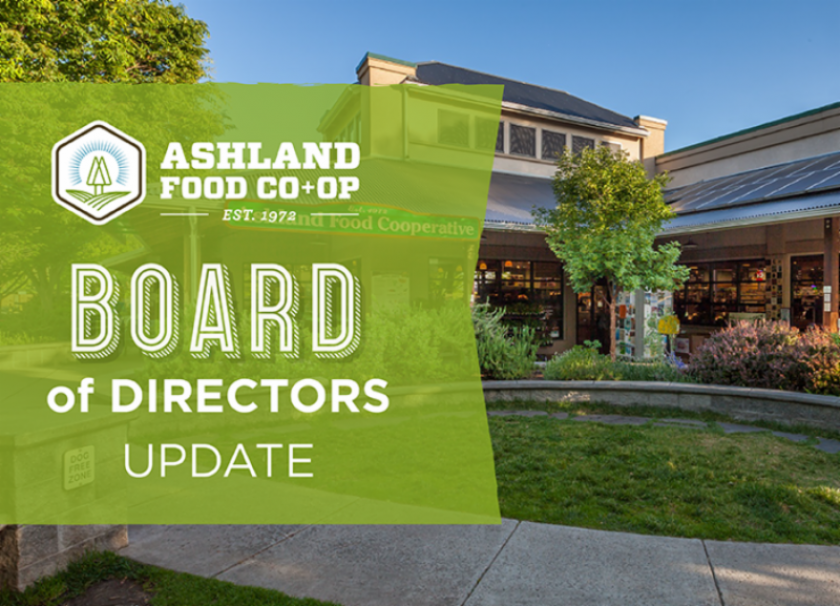
Open letter from AFC Board on Coronavirus Policies
The Ashland Food Co-op has played a critical role supporting our community for nearly 50 years by providing healthy food and a safe place to shop. With the recent COVID-19 shutdown, this support has been even more important and has stretched our organization in ways that we could not have anticipated. We have endeavored to address the needs of both our staff and our customers, hopefully in the most cooperative manner.
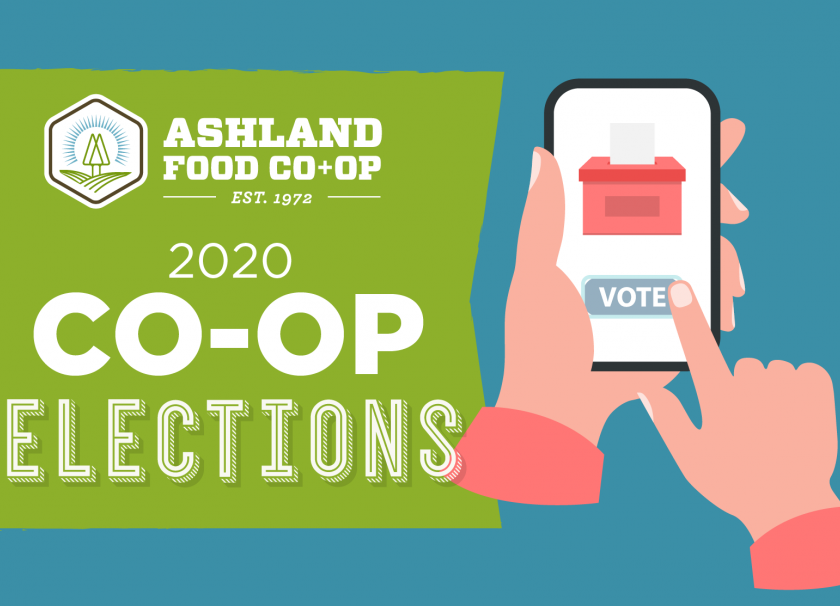
Owner Voting on 2020 Co-op Board & more
As an owner of the Ashland Food Co-op, you are an important decision-maker in the leadership of the Co-op! A vital part of your ownership is voting for the Board of Directors.
On the ballot: Vote for Board Candidates and Change for Good Organizations
Vote for Board Candidates
This year, four candidates are nominated for three Board positions: each elected Board director will serve a three-year term. The candidates are Ed Claassen, Mark Gibbs, Carolina Livi and Julie O'Dywer.
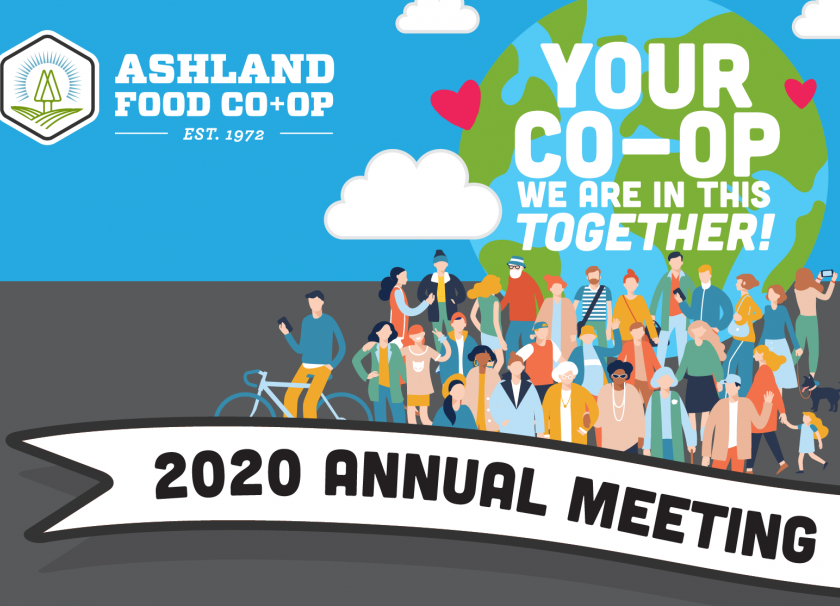
2020 Annual Meeting for Owners
Mark the evening of May 13 at 5pm on your calendar and join us for the 2020 AFC Annual Meeting. We’ll host the meeting online using Google Hangouts. Please click here to join the meeting, or call in at this number:
+1 617-675-4444
PIN: 719 680 293 2056#
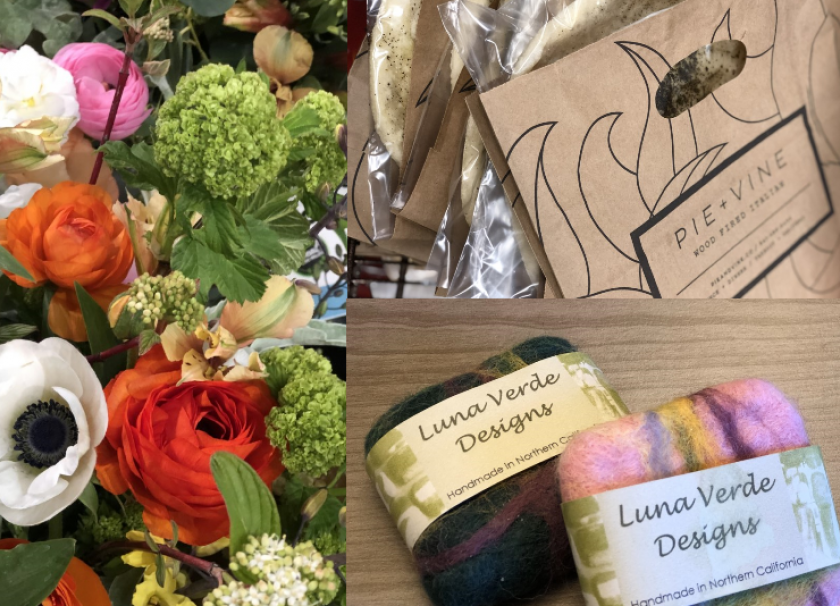
A dozen local favorites to explore this summer
The Co-op has always had a focus on supporting the strong local scene of growers and producers - and in these times, it's even more important. Here is just a small selection of some of our favorites from the area. Help support local businesses next time you stop by the Co-op by picking one of these products.

Unwavering Spirit in a Time of Change
By Emile Amarotico, General Manager
It’s been two months since my last update on our Co-op community, but it could just as well have been two years ago, or from an alternate reality! Needless to say, life at the Co-op has changed, and it hasn’t been easy for employees or shoppers. But despite the challenges, it has been an inspiring and reaffirming time that reminds us why we love the cooperative enterprise.
Staying Sustainable in A Changing World
By Rianna Koppel, Sustainability Coordinator
In the midst of a health crisis, how can we focus on sustainability? Let’s be real - these are tough times!
What does sustainability look like now? I like to refer to the definition of sustainability - meeting the needs of the present without compromising the ability of future generations to meet their needs. How can we meet the needs of the present, while keeping the future in mind?
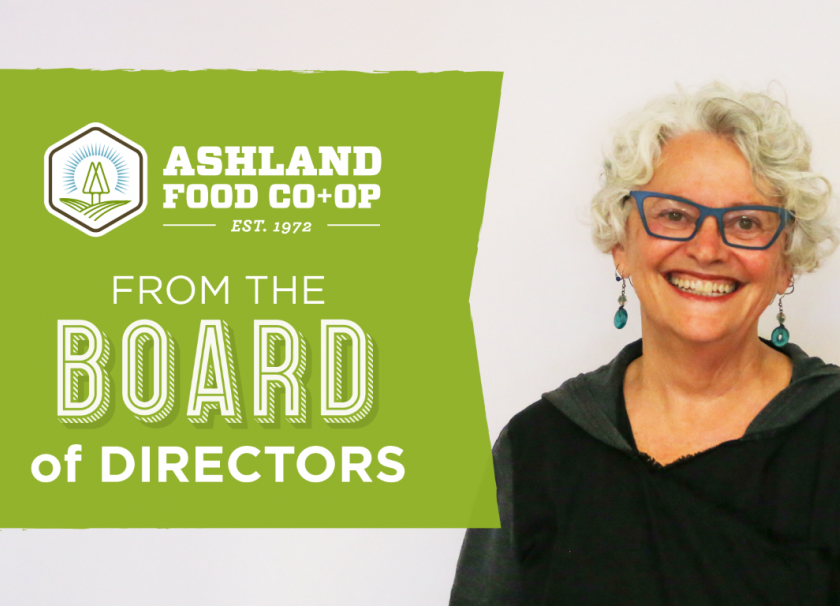
Democracy and Co-ops
By Annie Hoy, Board Director
This month, AFC Owners will democratically elect a slate of board candidates. These candidates are co-op owners, just like you and me. By holding annual elections, co-ops around the world and close to home are expressing Cooperative Principle 2: Democratic Member Control.
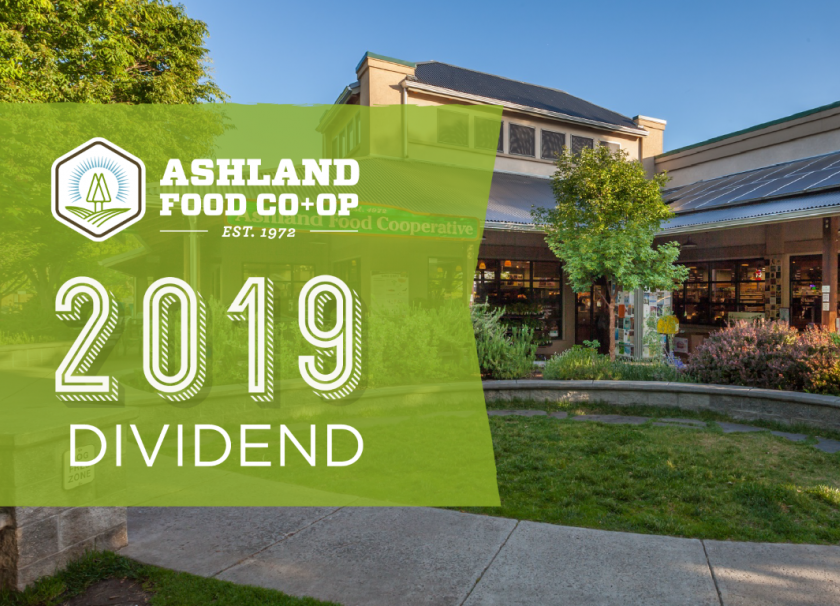
2019 Patronage Dividends are available now
From the Board of Directors:
This year, the Co-op Board of Directors is taking unprecedented action to distribute 100% of the over $628,000 2019 Patronage Dividend to our owners. In this time of great need, there is no holding back. This is not the moment to put away funds for the future, but rather to support our owners fully so that we may all have more strength to weather the storm.
Beans from Scratch
Michelle isn't serving up samples right now, so she's serving up kitchen tips instead! Here's her tried and true approach to cooking dry beans, plus some extra tips for upping your flavor, saving time, and cook other legumes. (Ingredients and modifications are below the video.)
Ingredients
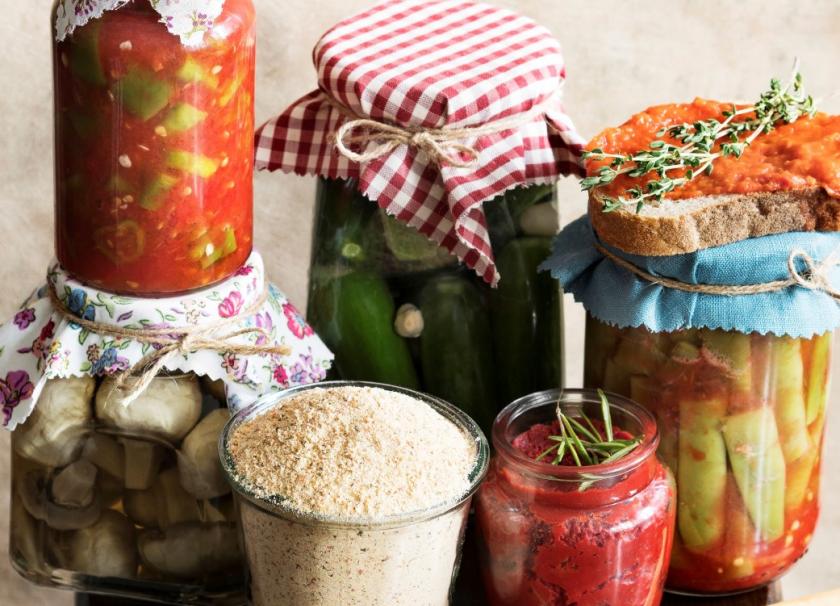
Tips to Stay Safe and Limit Waste
By Mahlea Rasmussen, Education Coordinator
Inspired by Bea Johnson's Zero Waste Home
We are in uncertain times and some of you may be second-guessing some of your zero waste practices and replacing them with safety measures for you and your family. I was proud not to have chemical cleaners in my home and never used plastic gloves - but now those products are being suggested for staying clean and safe. Here are some tips to keep your home safe while working towards more sustainability.

Ashland Food Co-op employees are heroes, worthy of respect and gratitude
Until a crisis like this occurs, few think of Grocers as essential service providers. However, our employees have been here day in and day out, risking their health and the safety of their loved ones, to provide food for our community. This is not a job that can be done from home or from what is now considered a safe social distance. Our employees have worked with the utmost professionalism, care, and concern for shopper well-being.
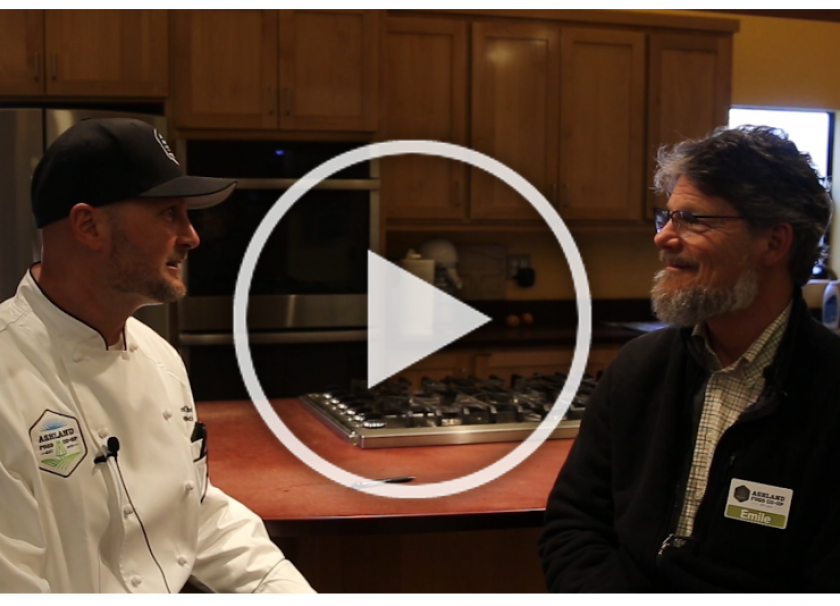
Meet Reagan Roach, AFC Executive Chef & Prepared Foods Manager
The Co-op's general manager, Emile Amorotico, sat down with the newest addition to the co-op's management team, Reagan Roach. Get to know Reagan in the interview below - and say hi when you see him in store!
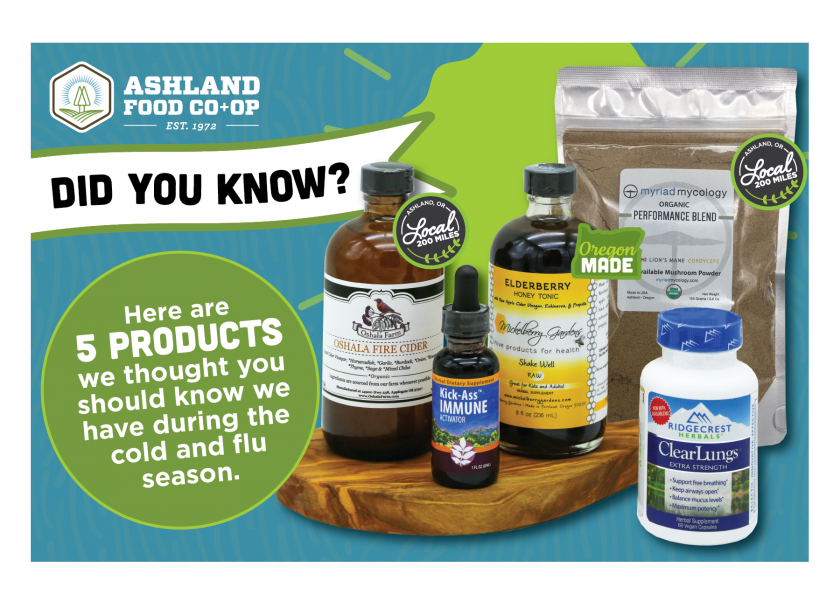
5 Things You Didn't Know the Co-op Carries for Cold, Flu & Immune Protection
- Wishgarden Herbs - Kick Ass Immune: Your total frontline immune defense!
- Oshala Farm - Oshala Fire Cider: Locally made in the Applegate. It tastes so good you could craft a healthy dressing with this fire cider!
- Mickelberry Gardens - Elderberry: Great Immune support for kids and adults. Made in Oregon.

